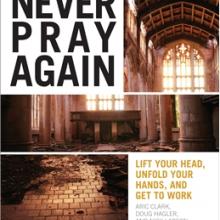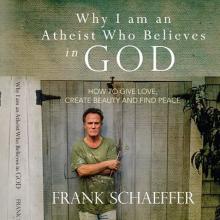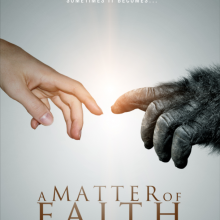Culture
There’s a place in the cultural conversation for both friars and fools, for those who discern truth through contemplation and prayer, as well as those who seek to reveal it through satire and silliness. But it’s not every day that both come together for substantive (if not always serious) theological conversation.
Aric Clark, Nick Larson, and Doug Hagler, also known online as Two Friars and a Fool, host such conversations on their blog and podcast about theology and spiritual practice, sexuality, and popular culture. They recently combined forces as well for their first book, Never Pray Again: Lift Your Head, Unfold Your Hands and Get to Work. The intentionally provocative title emphasizes the need for Christians to get outside of our own heads and churches, and about the business of being the hands and feet of Jesus in a world in need.
I chatted with the trio recently about their new project, as well as the “Never Pray Again” coloring book, which they crowd funded through a recently successful Kickstarter campaign.
Celebrity Rabbi Shmuley Boteach, spiritual counselor to Michael Jackson, onetime Republican candidate for Congress, and author of the best-selling “Kosher Sex” and “Kosher Jesus,” has a new book for Jews and non-Jews alike: “Kosher Lust.”
Its provocative subtitle: “Love Is Not the Answer.”
The answer, Boteach says, is lust, the God-given fuel for a healthy marriage. Love, he argues, cannot sustain marriage, but lust — what he calls the unfairly maligned member of the Seven Deadly Sins — can.
Spanish heartthrob Antonio Banderas may be cast in the role of Pope Francis in the first feature film to be made on the life of the Argentine pontiff.
Italian director Daniele Luchetti plans to make the $12 million Spanish language film, titled “Call Me Francesco,” with producer Pietro Valsecchi, who has made some of Italy’s highest-grossing movies.
Valsecchi’s Rome-based production house, Taodue Film, confirmed the news Wednesday, and a spokeswoman said the company was looking to shoot the film in various locations, including Argentina and Italy.
Banderas is one of the top Spanish-speaking actors being considered to play the lead role, she told Religion News Service.
One phrase comes to mind, time and again, when I think of Frank Schaeffer: “THINK AGAIN.” Any time I think I have a handle on things theological, he seems to find the thread, hanging from the edges, and gives it a good, solid yank.
Such is the case once again with his newest book, Why I am an Atheist Who Believes in God: How to give love, create beauty and find peace. Just when it seems the delineations between theism and atheism, between believers and nonbelievers, is sufficiently clear, Schaeffer blurs even those lines, leaving us to wonder what it is any of us actually believes and why.
Frank Schaeffer is not one to deconstruct theology (or even the lack thereof) with some kind of sadistic joy, leaving us to sort through the pieces. Rather he explores what I might call trans-theism, offering us practices, a vocabulary, and a worldview that take us far beyond belief toward a deeply human – and yet inexplicably transcendent – experience.
I asked Frank several questions about his new project; here is what he had to say.
FOR MORE THAN two centuries, the United States has been the proudest example of democracy in the world. Maybe not the best, but definitely the proudest. Oh sure, we’ve hit some rough patches over the decades, mainly in dealing with our native peoples and other ethnic minorities. Also with women, the poor, the falsely accused, the unemployed, and people who aren’t bankers. But let’s just call those growing pains.
For the most part, America has been that shining city on a hill, and by America, of course, I don’t mean Canada or Mexico, or the other countries whose names I forget, most of which don’t have many good hills to shine from anyway.
But I’m not talking about geography, I’m talking about pride. The pride that comes from being number one in democracy, despite being number 55th in infant mortality and 35th in math. Okay, so we don’t test well. But we’re proud anyway. And we’re still number one in Bible science! [High five!]
But lately, because of continued dysfunction on Capitol Hill, people are starting to whisper that democracy in the United States may have lost some of its shine, like we’re “hiding it under a bushel,” as it says in the old Christian campfire song of my youth. (We also sang “With Jesus in My Boat I Can Ride Out the Current Economic Downturn,” and “Children, Go Where I Text Thee.”)
But if America’s “little light” is no longer shining, at least a few other nations are providing good examples of self-government.
In just the latest evidence that a certain subset of conservative evangelical Christians really has no interest in occupying the real world with the rest of us, the trailer for a new movie called A Matter of Faith has hit the Internet.
The film follows the travails of a Christian father, who — horrified by the fact that his daughter’s college teaches the theory of evolution as a fact (gasp!) — challenges the villainous biology professor to a public debate that will no doubt settle the matter once and for all.
If this premise sounds strangely familiar, it could be that you’re remembering God’s Not Dead, a film released in March, in which a Christian student who — horrified by the fact that his philosophy professor is a committed atheist — challenges the dastardly nonbeliever to a debate on the existence of God that, no doubt, settled the matter once and for all.
(I’m told that the new movie was called Christians vs. the Straw Man II: This Time It’s Personal throughout production, before filmmakers decided to rename it A Matter of Faith.)
The similarities between the two pictures don’t stop there.
I grew up in the days of the encyclopedia salesman. I clearly remember the day when a clean-cut well-dressed man knocked on our apartment door to sell the 26-volume World Book Encyclopedia.
We were recent immigrants and could not speak English fluently. We had few worldly possessions and the last thing we needed in our house was a 26-volume encyclopedia.
After the hour presentation during which we flipped through the volumes full of exciting information, my dad said no. The salesman looked sad and pitiful as he packed his sales kit. As he exited the door, he gave one last pitch and, suddenly, my dad changed his mind and we bought the whole set.
Either the salesman was good or my parents had this strong desire that their children needed to know “everything there is to know about the world.” Maybe it was a bit of both.
In 2014, long gone are those 26-volume encyclopedias that once filled the bookshelves of many of my childhood friends’ homes. Now we have everything that we need to know at our fingertips through iPads, computers, cell phones, or other gadgets.
Nostalgia drives liturgical change as much as it drives musical entrepreneurship. What songs warm our hearts? What reminds us of grandmother? A song might symbolize an imagined, more perfect, time in the church. Nostalgia and utopian dreams of the past collude and what emerges is new liturgy.
The new is born of ideations of the old. The new is born of nostalgia as much as anything else.
Of course, most of us are nostalgic for times and places that are irrecoverable. How we partake of the table feast is predicated on what moves our heart. And it is mediated by the liturgical power structures of our own traditions. Perhaps you have a prayer book like the 1979 Book of Common Prayer. So, you try to create a liturgy for both you and your grandmother even though your grandmother still perceives the 1979 Book of Common Prayer as an innovation and not the church of her childhood for which she too is very nostalgic. She misses her parents. She misses her grandparents.
KISS may have been on the cover of the April 10 issue of Rolling Stone, but the most eye-opening headline may have been the one that proclaimed: “Gay, Mormon & Finally Out.”
After years of denials and lyrics that obscure the issue, Glenn declared proudly that he is gay — and still a devout member of The Church of Jesus Christ of Latter-day Saints.
“I believe and I have faith and I was born with this,” Glenn told The Salt Lake Tribune in one of the first interviews since coming out.
A wide-eyed 4-year-old makes a fairly convincing case for the existence of an afterlife in Heaven Is for Real. But it’s Greg Kinnear, with his characteristic affability, who just about seals the deal.
Humor infuses the film (rated PG), which opens nationwide Wednesday (April 16) and is based on the best-selling book. By focusing on the bond between father and son, the movie avoids being heavy-handed or preachy, a wise choice for a film that asserts heaven exists, based on the earnest insistence of a precocious preschooler.
Video courtesy of Sony Pictures Entertainment via YouTube
Think Christmas, and carols come to mind: “Joy to the World,” “Silent Night,” “The First Noel.” But think of the other great Christian season — Holy Week and Easter — and most people draw a musical blank.
“The music written for Holy Week is some of the richest in our literature,” said David Ludwig, dean of artistic programs at Curtis Institute of Music in Philadelphia.
Could a series of “blood moon” events be connected to Jesus’ return? Some Christians think so.
A string of books have been published surrounding the event, with authors referring to a Bible passage that refers to the moon turning into blood. “The sun shall be turned into darkness, and the moon into blood, before the great and terrible day of the Lord,” Joel 2:31 says.











